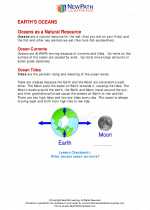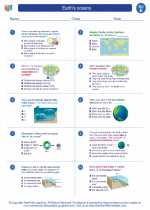Earth's Oceans
Earth's oceans cover about 71% of the planet's surface and play a vital role in regulating the climate, providing food and resources, and supporting diverse ecosystems. They are divided into five main ocean basins: the Pacific, Atlantic, Indian, Southern (or Antarctic), and Arctic oceans.
Ocean Composition
Oceans are composed of saltwater, with an average salinity of about 3.5%. The water in the oceans is in constant motion, driven by factors such as currents, tides, and waves.
Ocean Zones
Oceans are divided into different zones based on depth and distance from the shore:
- Intertidal Zone: Area between high and low tide marks, where organisms are adapted to frequent exposure to air and water.
- Neritic Zone: Extends from the low tide mark to the edge of the continental shelf, where sunlight reaches the ocean floor and supports a diverse range of marine life.
- Oceanic Zone: Beyond the continental shelf, where the water is deeper and sunlight penetration is limited, home to a variety of deep-sea creatures adapted to the dark and cold conditions.
Ocean Currents
Ocean currents are like rivers within the ocean, flowing in specific patterns and directions. They are primarily driven by wind, temperature, and the Earth's rotation. Major ocean currents include the Gulf Stream in the Atlantic and the Kuroshio Current in the Pacific.
Marine Ecosystems
Oceans support a wide range of ecosystems, including coral reefs, kelp forests, and deep-sea hydrothermal vents. These ecosystems are home to diverse marine life, from microscopic phytoplankton to large predators like sharks and whales.
Human Impact
Human activities, such as overfishing, pollution, and climate change, have a significant impact on the health of the oceans. It is important to promote sustainable practices and conservation efforts to protect the oceans and their valuable resources.
Study Guide
Here are some key points to remember when studying Earth's oceans:
- Identify the five main ocean basins and their locations on a world map.
- Explain the factors that contribute to ocean currents and their effects on climate and marine life.
- Describe the different ocean zones and the unique characteristics of each zone.
- Discuss the importance of oceans in supporting global ecosystems and the impact of human activities on marine environments.
◂Science Worksheets and Study Guides Fifth Grade. Earth's oceans

 Worksheet/Answer key
Worksheet/Answer key
 Worksheet/Answer key
Worksheet/Answer key
 Worksheet/Answer key
Worksheet/Answer key
 Vocabulary/Answer key
Vocabulary/Answer key
 Vocabulary/Answer key
Vocabulary/Answer key
